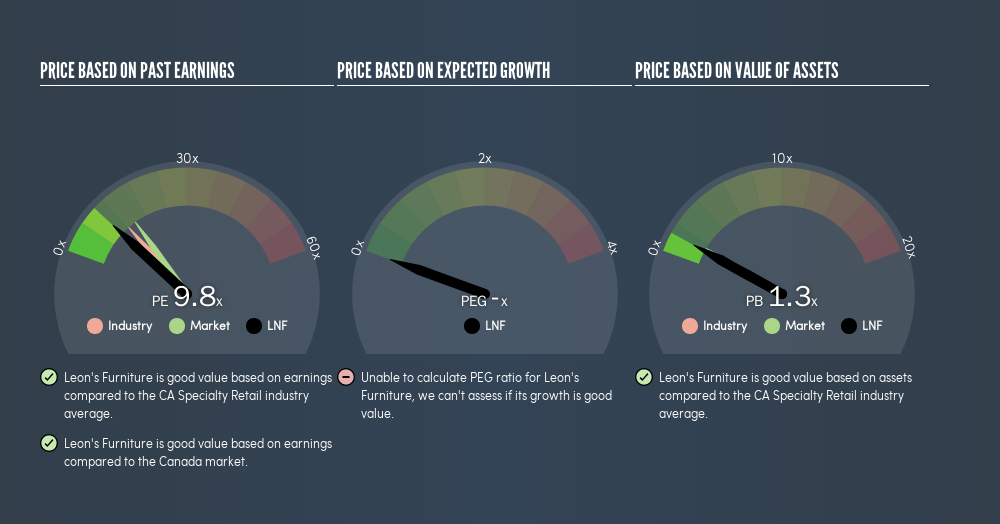
The goal of this article is to teach you how to use price to earnings ratios (P/E ratios). We'll show how you can use Leon's Furniture Limited's (TSE:LNF) P/E ratio to inform your assessment of the investment opportunity. Leon's Furniture has a P/E ratio of 9.82, based on the last twelve months. In other words, at today's prices, investors are paying CA$9.82 for every CA$1 in prior year profit.
View our latest analysis for Leon's Furniture
How Do You Calculate A P/E Ratio?
The formula for price to earnings is:
Price to Earnings Ratio = Price per Share ÷ Earnings per Share (EPS)
Or for Leon's Furniture:
P/E of 9.82 = CA$14.28 ÷ CA$1.45 (Based on the year to December 2018.)
Is A High Price-to-Earnings Ratio Good?
A higher P/E ratio means that investors are paying a higher price for each CA$1 of company earnings. That isn't necessarily good or bad, but a high P/E implies relatively high expectations of what a company can achieve in the future.
How Growth Rates Impact P/E Ratios
Earnings growth rates have a big influence on P/E ratios. Earnings growth means that in the future the 'E' will be higher. That means unless the share price increases, the P/E will reduce in a few years. Then, a lower P/E should attract more buyers, pushing the share price up.
Leon's Furniture increased earnings per share by 9.7% last year. And it has bolstered its earnings per share by 9.4% per year over the last five years.
How Does Leon's Furniture's P/E Ratio Compare To Its Peers?
We can get an indication of market expectations by looking at the P/E ratio. We can see in the image below that the average P/E (12.2) for companies in the specialty retail industry is higher than Leon's Furniture's P/E.

Its relatively low P/E ratio indicates that Leon's Furniture shareholders think it will struggle to do as well as other companies in its industry classification. Many investors like to buy stocks when the market is pessimistic about their prospects. You should delve deeper. I like to check if company insiders have been buying or selling.
A Limitation: P/E Ratios Ignore Debt and Cash In The Bank
Don't forget that the P/E ratio considers market capitalization. That means it doesn't take debt or cash into account. Theoretically, a business can improve its earnings (and produce a lower P/E in the future), by taking on debt (or spending its remaining cash).
Such expenditure might be good or bad, in the long term, but the point here is that the balance sheet is not reflected by this ratio.
How Does Leon's Furniture's Debt Impact Its P/E Ratio?
Leon's Furniture has net debt worth just 2.1% of its market capitalization. So it doesn't have as many options as it would with net cash, but its debt would not have much of an impact on its P/E ratio.
The Verdict On Leon's Furniture's P/E Ratio
Leon's Furniture trades on a P/E ratio of 9.8, which is below the CA market average of 14.8. EPS grew over the last twelve months, and debt levels are quite reasonable. If growth is sustainable over the long term, then the current P/E ratio may be a sign of good value.
When the market is wrong about a stock, it gives savvy investors an opportunity. If the reality for a company is not as bad as the P/E ratio indicates, then the share price should increase as the market realizes this. So this freevisualization of the analyst consensus on future earnings could help you make the right decision about whether to buy, sell, or hold.
Of course, you might find a fantastic investment by looking at a few good candidates. So take a peek at this freelist of companies with modest (or no) debt, trading on a P/E below 20.
We aim to bring you long-term focused research analysis driven by fundamental data. Note that our analysis may not factor in the latest price-sensitive company announcements or qualitative material.
If you spot an error that warrants correction, please contact the editor at editorial-team@simplywallst.com. This article by Simply Wall St is general in nature. It does not constitute a recommendation to buy or sell any stock, and does not take account of your objectives, or your financial situation. Simply Wall St has no position in the stocks mentioned. Thank you for reading.
About TSX:LNF
Leon's Furniture
Operates as a retailer of home furnishings, mattresses, appliances, and electronics in Canada.
Flawless balance sheet, undervalued and pays a dividend.
Similar Companies
Market Insights
Community Narratives





